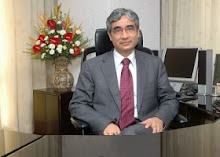Background
• Name: Mr Saarathi
• Time: October, 2005
• Designation now: DGM (O&C), LHO Bhuvaneshwar
• Designation then: DGM (Module)
• Place: Bardwaan district, 150 km for Kolkata
The Bardwaan Module comprised 4 districts including Bardwaan, Purulia, Bankura and Birbhum. 173 branches, 300-400 villages, 20 lakh in Barwaan itself
The Initial State
• Largely Agri-based population (apart from a belt of steel activity near Durgapur and some coal mines)
• Main crops: Paddy in Khareef season, Potato in Rabi
• Ganga, Ajay and Damodar rivers – were perennial sources of water
• Land holdings were mostly very small (approx half acre)
• SBI mostly financed the 400-odd potato cold storage warehouses and 350 rice mills in the area as term loans for maintenance
• Loans mostly given to cold storage owners and middlemen against warehouse receipts to middlemen. Middlemen bought the produce from the farmers at throwaway prices, stored them in the warehouses using these loans and then sold them later at much higher prices in the markets
• Farmer Exploitation: In this sense, SBI was aiding their operations and turning a blind eye to the farmers, who were mostly dependent on co-operative societies for financing (at 12% p.a.). They were also required to keep 10% of the loan amount as deposits with the society. The cooperatives also mandated that fertilizers, seeds etc be bought from them and not the market even if competitive rates were offered there.
BMs happy giving big ticket loans in February as it made meeting targets easier. No loans below 5 lakh given. So, branch out-standings fell after April because farmers were hardly given any loans.
The Proposed Solution
• Mr Sarathi tried to encourage branches to lend to farmers. But branches felt that the co-operatives would be antagonized and they would lose their deposits.
• Huge meetings called in branches, farmers called, educated about financing from State Bank. Melas set up for 200-300 farmers each. Sample documentation, information given, banking explained to them at these melas. Sometimes forms got filled and accounts were opened, loan applications filed.
• RACPC Head also got involved, process gained momentum and no of applications flowing in went up.
• The volumes became so high that the branches got worried about the increased workload.
• Mr Sarathi, then, set up the first Agricultural CPC (today called Rural CPC) of India.
• Though there was a shortage of staff, the CGM Mr U. S. Roy gave him his support and the first Agri CPC was set up in his own office with a set of handpicked people selected by him.
• All processing was done and sanction letters were delivered through courier to branches along with the filled documents so that the farmer just had to come and sign the forms. The branch then just had to get his sign, not do any documentation.
In the next season, he financed summer crops also. Set up a milk chilling plant in the district, payment made through the bank.
Realized End State
Customer Wins:
• Elimination of middlemen corruption
• Freedom to buy the seeds from anywhere at lowest prices
• Loans at lower rates of interest, easier access to finance
• Ability to command the price of their produce
• Warehouse receipt loans from SBI
• Incomes levels surged by 25-30%
This encouraged them to further expand their income-generating activities, SHGs soon came up – sari design (600 weavers per village) and sale (middleman removal here also), poultry farms etc were set up, standards of living rose.
Bank Wins:
• The Module got 7000 applications for KCC loans within 2-3 months. More loans were given for warehousing etc also. 13-14 crores in deposits came in that year. Floriculture, vegetable cultivation etc. contributed another 2-3 crores.
• The crop loan taken by the farmer was repaid by the cold storage receipt loan, cold storage receipt loan was repaid when they sold their produce at higher prices – hence, better loan repayment
Sustainability Dynamic
• Agri CPC continued, 2 more started later, now RCPC bank-wide. Idea replicated all over India, spread to other states also, like Andhra Pradesh, Orissa etc.
Subscribe to:
Post Comments (Atom)





No comments:
Post a Comment